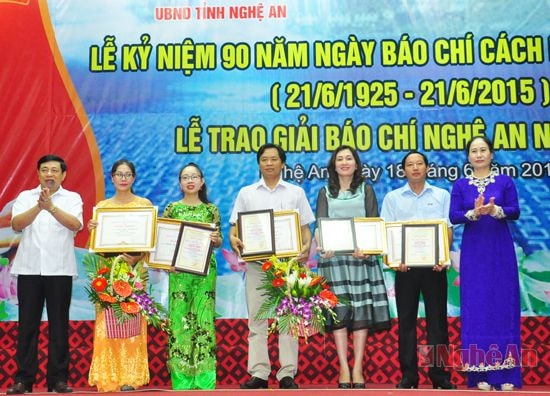Passion for "common child"!
(Baonghean) - Reporter chatted with journalist Ngo Duc Chuyen - Head of Electronic Newspaper Department, Nghe An Newspaper, co-author of the First Prize of Nghe An Provincial Press Award in 2014 with the work "Speeding up the progress of site clearance on National Highway 1A"
- Hello journalist Ngo Duc Chuyen, in the atmosphere of the 90th anniversary of Vietnam Revolutionary Press Day, the 2014 Press Awards ceremony of Nghe An province further encourages and promotes the spirit of journalists. Could you share some thoughts from the perspective of a person in the profession?
 |
| Provincial leaders awarded Certificates of Merit to authors and groups of authors who won First Prize at the Nghe An Press Awards 2014. |
- When talking about journalists, people often think of someone with outstanding language and writing skills. Of course, those are the most prominent and easily "recognizable" characteristics of journalists. But in fact, journalism requires more than just a writer. Along with the continuous development of society, the requirements for journalists - those whose mission is to be the voice of the times - also change and move constantly. It can be daring, dedication, and recklessness for war reporters; understanding and proficiency in the financial world for economic reporters; proficiency in using specialized hardware and software for television and electronic newspaper reporters;...
But there is one thing that I consider “unchangeable”, which is the carefulness, meticulousness, and meticulousness that reporters in any era, space, or field must have. This requirement runs through the entire process of a reporter’s work: from researching the topic, exploiting information to implementing and completing the work. To have works that are “rich” in material and have depth, reporters must consciously equip and prepare themselves with a wealth of knowledge about the topic or subject they are assigned before researching and exploiting information at the grassroots level. There were times when I not only had to resort to books, documents, and the internet, but also had to consult many experts in the industry to be able to understand correctly, fully, and deeply the nature of the problem. When we say we are journalists to guide public opinion, if we ourselves do not understand the problem correctly, how can we guide public opinion to the right view? In addition, preparing well and checking carefully the equipment used for work such as cameras, computers, recorders, memory cards, etc. is also a style that a reporter must have.
- A successful journalistic work is one that creates a good effect on public opinion. In your opinion, what should a reporter do to establish an interactive relationship with readers?
- The relationship between journalists and readers is somewhat similar to the supply-demand relationship. Because information is also an important need of society. From that perspective, journalists need to ask themselves and answer the following questions: What do readers want to know? What do they know and see? What do they need to know and understand? To do so, there is no other way but to put yourself in the position of the reader, "transform" into their position and perspective to understand them, before wanting to make them understand your point of view and argument. The diverse "transformation" of the "role" of the journalist who collects information can be seen as a form of operational skill, because it determines the amount of information we collect as material for the article. The more approaches, the more "full" and closer to reality the information is. Or sometimes it is multi-dimensional information, requiring us to analyze, evaluate, filter, and synthesize. Many times I think that journalists are like playing a jigsaw puzzle with countless pieces that are scattered and seemingly unrelated to each other. Arranging and connecting those separate pieces of information into an article, a unified picture that anyone who looks at it will find familiar and correct. That is when journalists complete their task of reflecting society, unifying the views of readers who are inherently divided in their views.
- So it can be said that the success of the work "Speeding up the progress of land clearance on National Highway 1A" is the combination of the reporter's professional skills and the response and interaction of the readers?
- Correct but not enough. The article is a picture of social perspective with many details, and the process itself, so the article is also a process with many stages, many participants. The reporter is just a link in that "production" chain. Originating from the idea, vision and direction of the editorial board, the reporter is the person directly responsible for the content and then has to go through the "cooking" stage of the editorial secretary, through the "decorating" hands of the computer technical department. How to "scrub" the article, how to choose the photo to attract the attention of readers... All are extremely meticulous stages, making the success of an article. People often associate reporters with the image of a lone traveler, but in fact this is a job that requires a high level of collective effort. Just like in football, people often talk about the player who scores, but victory is shared, due to the efforts of everyone. The success of the work “Accelerating the progress of land clearance on National Highway 1A” is the same. It is a collective intellectual product, bearing the common mark of Nghe An Newspaper and most importantly, we appreciate it not only because it is an award-winning work, but also because it is a common “brainchild” born from the passion of party journalists!
- Thank you journalist Ngo Duc Chuyen for this conversation!
Thuc Anh
(Perform)






